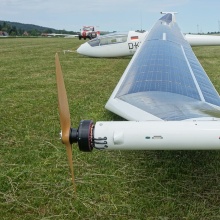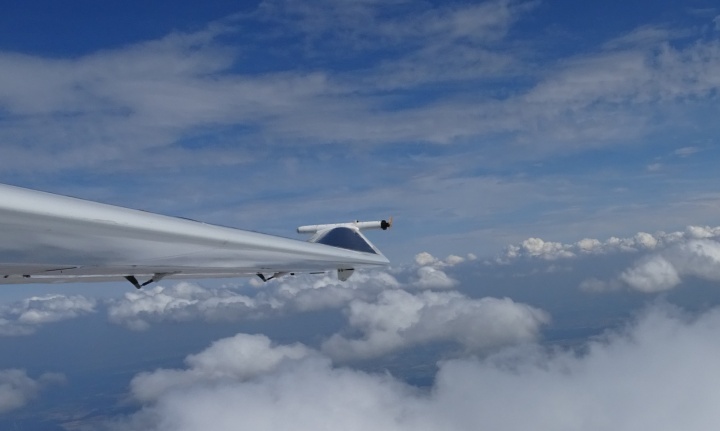In the future, electric wing end propulsion systems can simplify the control of aircraft. This is the conclusion after the first manned test flights of the solar aircraft “icaré wtp”, which is equipped with two electric wingtip propellers (wtp). The wing end propulsion and control systems have been developed since the beginning of 2018 by the Institute of Aircraft Design (IFB) and the Institute of Flight Mechanics and Control (IFR) at the University of Stuttgart.
The wing end propulsion systems are mounted on the two wingtips on removable pods, which can be configured in different ways and weigh nine kilos each, and are equipped with their own batteries and measuring sensors. The electric propeller-motors, which are rather low-performance with regard to propulsion, offer the possibility of an active yaw control in addition to the rudder function. The motors can be controlled either manually or automatically. The pilot can enter the control command via a newly installed side stick. Alternatively, it is given directly to the rudder or, optionally, with the aileron input. Johannes Schneider from the Institute of Aircraft Design at the University of Stuttgart says: “This is an internationally leading project in the fields of “distributed propulsion” and “controlling through propulsion systems at the wing ends”.
With wing end propulsion systems, aircraft control can be simplified, empennages become smaller, the weight can be reduced, the range increased, and the aircraft can become more maneuverable. Furthermore, they are an additional safety aspect, particularly in general aviation with smaller sports airplanes, by supporting the main propulsion as an auxiliary propulsion. Another possibility is that the propellers take control of the movement around the plane's yaw axis and thus relieve the pilot. In commercial aviation, too, these propulsion systems could be used in a similar way and reduce the air resistance or the wake turbulence at the wing ends.
The solar aircraft icaré has been operating as a test airplane of the Faculty of Aerospace Engineering at the University of Stuttgart for more than 20 years. The wing end propulsion project is supported by the technical support of SFL GmbH and the test pilot Werner Scholz, who was already involved in the construction of icaré.
Expert Contact:
Johannes Schneider, Institute of Aircraft Design (IFB), University of Stuttgart, Phone: 0711 685 60483, Mail



